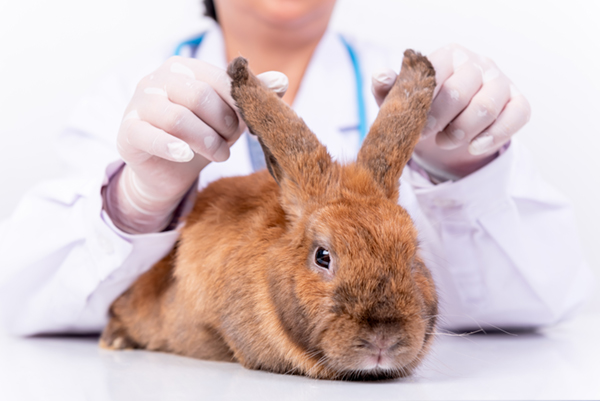Rabbit Advice
This information pack gives some important information about how to keep your new addition happy and healthy as they settle in and throughout their lives. If you have any questions or would like to discuss any specific concerns please ask.
Rabbits can make excellent pets, but they require a lot of care to make sure their needs are being met. They are happy living outdoors or indoors but care should be taken to ensure their environment is safe and provides enrichment. Properly cared for, rabbits can live for 7-10 years.
As well as treating animals who are unwell, we try to prevent health problems wherever possible. This includes vaccinations, neutering, good diet, companionship and socialisation.
Housing
Rabbits can be kept outdoors or indoors
They can be kept in cages or hutches but they should not be confined 24 hours a day. Rabbits are very active and need to be able to move around. They are most active at dawn and dusk, so letting them out in the middle of the day doesn’t suit their natural body clocks. Cages and hutches sold for rabbits are often too small – they should be at least 2m in length and tall enough that your rabbit can stand up on its hind legs. An attached run (2×2.5m) is ideal but you will need to stop them tunneling out!
It is important that your rabbits home is secure from predators, dry, well ventilated and dust and draft free. They will need deep, fresh bedding to keep warm and to help them feel secure – soft straw is ideal, paper or wood shavings are also good. You can also use absorbent materials such as wood or paper cat litter pellets or pulped paper (Megazorb) as long as you also provide other material for warmth. Avoid sawdust or clumping cat litter. Bedding should be changed when soiled, ideally toilet areas should be done daily and everything else once or twice weekly.
If keeping house rabbits care should be taken to rabbit-proof the area of the house they can access. Rabbits will chew wires if they can reach them so these must be moved or protected. They may also chew other things they shouldn’t, especially when young so if is important to supervise them and give them toys to play with. Rabbits can be litter trained quite easily.
Rabbits are vulnerable to heat stress because they cannot pant effectively or sweat to cool themselves down. Always provide a shaded area outside or access to a cooler room if indoors.
Companionship
Rabbits are hard-wired to be sociable animals and so should not be kept alone. Rabbits kept in pairs (or more!) are happier and healthier than rabbits kept alone and studies have shown that rabbits will seek companionship over food. The benefits of having a friend include being able to share warmth, mutual grooming, reduced stress and increased confidence. Guinea pigs are not suitable companions for rabbits.
If you would like to get a companion for your rabbit please consider adopting a rescue bunny. Many rescue centres vaccinate, neuter and healthcheck rabbits before rehoming them and are very knowledgeable and experienced with successfully introducing rabbits.
Regular gentle handling of young rabbits is essential to bond with them and get them used to human interaction, take particular care that children are calm and gentle. If your rabbit is stressed during handling it is best to give them a break and try again later.
Diet
Wild rabbits eat a diet that mostly consists of grass and it is important to replicate this in pet rabbits. Hay can be fed instead of grass but never feed grass clippings as these ferment rapidly and can be harmful. Good quality grass hay should smell sweet, be dry and free from dust and mould. Your rabbit should be given free access to eat as much hay or grass as they want to and this should make up 80% of their diet. Offer a pile that is at least as big as your rabbit daily.
Fresh vegetables and greens should be fed daily and should make up 15% of your rabbits diet – approximately a handful twice daily. Aim to vary what you give them and feed small portions of each type of plant.
The best commercial rabbit foods are relatively high in fibre (>20%), low in protein (<15%) and are pellets rather than muesli. Feeding muesli allows your rabbit to selectively eat the bits s/he likes and this has been directly linked to dental problems. Commercial food should make up the final 5% of your rabbits diet and for a medium sized rabbit this is around an egg cup full daily – overfeeding is a major cause of obesity.
It is important that any changes to your rabbit’s diet are made slowly because sudden changes can cause digestive upsets, diarrhoea and gut stasis. Introduce new green’s one at a time in small amounts and feed it for several days. If you are introducing a new commercial diet, increase the amount slowly over 4-5 days. Please check your rabbit carefully for any signs of reduced appetite, diarrhoea or reduced production of faeces, generally this will be mild and stop after a few days without any treatment. Contact the surgery if you have any concerns.
Clean fresh water should always be available. Rabbits generally prefer to drink out of bowls rather than bottles but these can be knocked over so should be checked regularly. Heavy ceramic bowls are less likely to be knocked over and you can provide more than one or a bowl and a bottle.
Vaccinations
We vaccinate rabbits against three diseases: Myxomatosis and Rabbit Haemorrhagic Disease (RHD) type one and type 2. These are highly infectious viral diseases that are usually fatal and for which we don’t have effective treatments. They are spread by insects and RHD is airbourne so the only effective protection for your rabbit is vaccination. A combined vaccination is available that can be given from 5 weeks of age. Only one dose is required and your rabbit will be protected after 3 weeks. Annual boosters are required.
Neutering
Neutering is beneficial for all rabbits. Opposite sex pairs seem to work best socially but rabbits are renowned for their fertility and can breed from approximately 4-6 months of age. Unneutered opposite sex pairs should not be kept together. There are many other benefits to neutering
Castrating male rabbits reduces urine spraying and makes litter training easier. Some entire male rabbits can be aggressive, this is reduced or eliminated by castration – making them more relaxed with humans and able to live with other rabbits.
Unfortunately around 80% of unspayed female rabbits will develop uterine cancer by the age of 5. Spaying them while young and healthy removes this risk, as well as preventing false pregnancy, pyometra (womb infection) and reducing the risk of mammary (breast) cancers. Some unspayed females can be aggressive towards humans and other rabbits, which is reduced or eradicated by neutering.
All surgical procedures and general anaesthesia carry risk, and this risk is higher in rabbits than in cats and dogs. However for most rabbits the benefits of neutering outweigh the risks.
Microchipping
Rabbits can be microchipped and this is a good idea due to their talents for escaping! This involves an injection between the shoulder blades so can either be done during an appointment or when they are anaesthetised for neutering.
Health Checks
Being a prey species rabbits often do not show signs of illness until they are very unwell, therefore we recommend they are health checked every 6-12 months by a vet.
It is important that you check your rabbit twice daily, paying particular attention to their eyes, nose, ears, bottom, skin and feet. You can check their front teeth regularly at home but not back teeth. Keep a close eye on your rabbits eating habits and droppings.
Remember that rabbits try to hide when they are unwell or in pain so if you suspect that there is a problem, please contact the surgery and make an appointment as soon as possible.
Insurance
We recommend that you insure your rabbits to ensure that they can receive the best care should they become unwell or have an accident.
Filey Veterinary Practice

1 Station Avenue
Filey
YO14 9AH
01723 513119


